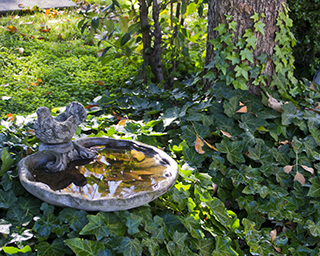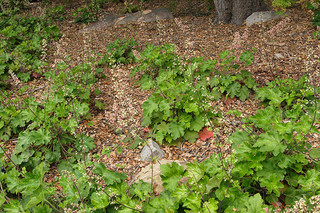 Hedera helix. Photo by Jeb Bjerke (cc).
Hedera helix. Photo by Jeb Bjerke (cc).
English ivy (Hedera helix) is a woody vine and groundcover from Europe with many cultivars, some of which have escaped cultivation to cause serious problems. English ivy has been planted extensively for its evergreen foliage and because it is easy to grow in shady to full sun conditions. However, it can escape gardens and spread rapidly by vegetative growth and by birds that distribute its seeds. English ivy quickly takes advantage of disturbed areas to shade-out and outcompete understory vegetation, and can also kill overstory trees after climbing to and dominating the canopy. Deciduous trees are particularly vulnerable to English ivy because the vine can take advantage of the extra light in winter after the tree leaves have fallen, and further shade the understory, preventing new saplings. The excess weight of English ivy may cause additional damage to trees during winter storms. English ivy can also affect local wildlife by displacing the plants they depend on. English ivy has invaded California and the northwestern United States and is particularly a problem in regions near the coast.
Once established in an area, English ivy is very costly and labor intensive to eradicate. English ivy can overrun your garden, climb fences, and invade your neighbor’s yard and nearby natural areas. The leaves and fruit of English ivy are toxic to humans and livestock and the sap can irritate skin. Despite the economic and environmental cost, nurseries continue to sell English ivy, and consumers continue to buy and plant it in their gardens. Although this plant may seem like a great ground cover for empty spaces, please don’t plant this species, and instead choose an effective alternative without the negative consequences.
Native Alternative
 Heuchera maxima. © Van Swearingen.
Heuchera maxima. © Van Swearingen.
Alumroot (Heuchera micrantha orHeuchera maxima) is a perennial plant that is native to California. It prefers shady to partly shady conditions, requires only occasional to moderate watering, and is adaptable to many soils which means that it will thrive in many of the same areas as English ivy. The rich green leaves of the plant are an attractive alternative to covering the ground with English ivy, with the added benefit of beautiful white to pink flower stalks in spring and summer. Although alumroot is not a vine and does not spread like ivy, it keeps its leaves year-round and works well when mass planted. Alumroot is a great alternative to invasive English ivy that provides a similar function, but without the cost or labor of controlling it or the other potential negative impacts. Try this native alternative in your garden!